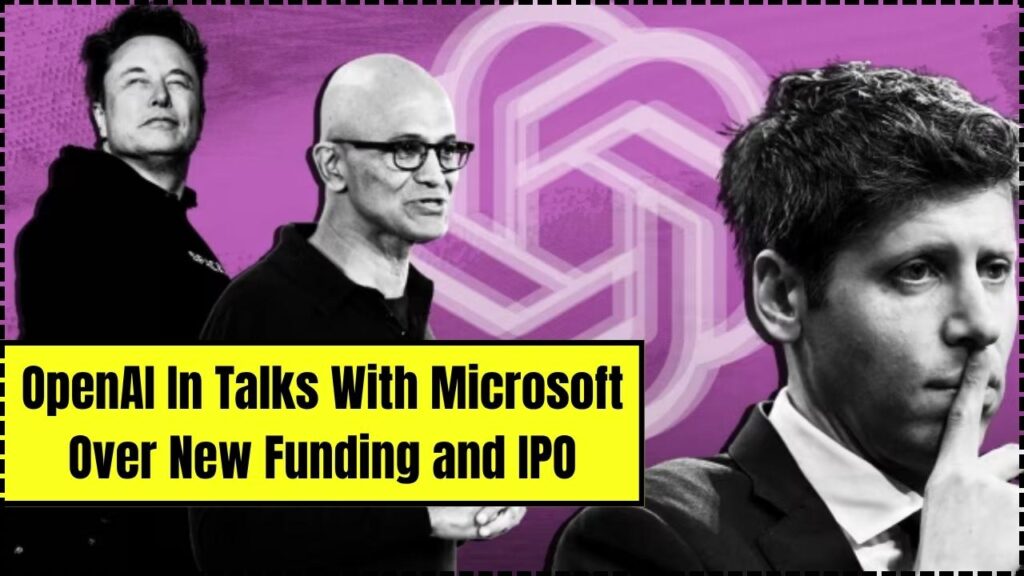OpenAI In Talks With Microsoft Over New Funding: OpenAI, the artificial intelligence company that gave the world ChatGPT, is entering a new phase of growth as it reportedly negotiates a significant update to its multi-billion-dollar partnership with Microsoft. These talks may not only reshape OpenAI’s future as a technology leader but also position it for a groundbreaking initial public offering (IPO) that could value the company at over $100 billion.

According to Financial Times and Reuters, OpenAI and Microsoft are deep in discussions to revise the terms of their relationship, originally established in 2019. The stakes are high—not just in terms of investment, but also in how artificial intelligence is scaled, governed, and made accessible across the globe.
OpenAI In Talks With Microsoft Over New Funding
| Feature | Details |
|---|---|
| Companies Involved | OpenAI, Microsoft |
| Current Partnership | $13+ billion investment from Microsoft since 2019 |
| Negotiation Focus | IPO readiness, equity adjustments, funding access |
| Valuation Target | Over $100 billion |
| Governance Shift | Transition to Public Benefit Corporation (PBC) |
| Strategic Goal | Enhance ethical scalability and innovation |
| Official Site | OpenAI.com |
OpenAI’s ongoing talks with Microsoft and its potential IPO signal a new era for the AI industry. By balancing innovation with integrity, and growth with governance, OpenAI is charting a path few companies have dared to explore. If successful, this transition could redefine how technology companies engage with the world—commercially, ethically, and culturally.
Through a reimagined partnership, a public market debut, and the adoption of a Public Benefit Corporation model, OpenAI is not just preparing to scale—it’s preparing to lead by example.
What’s Behind the Negotiations?
At the heart of these discussions lies a complex balancing act: how can OpenAI maintain its mission-first identity while also scaling to meet massive global demand for its technologies? Microsoft’s substantial investment has played a crucial role in OpenAI’s ability to innovate rapidly, yet new funding needs and broader ambitions mean the structure must evolve.
The renegotiated terms are expected to give OpenAI more independence and flexibility in seeking funding, while allowing Microsoft to retain long-term access to OpenAI’s cutting-edge models through exclusive licensing agreements.
One notable potential change is Microsoft’s willingness to reduce its equity stake in OpenAI in return for prolonged access to its technology suite. This aligns with Microsoft’s strategy of embedding AI into its services—Azure, Office, and Bing—rather than directly controlling OpenAI.
The IPO Opportunity
A potential IPO for OpenAI would be one of the most highly anticipated public listings in tech history. Analysts project a valuation in excess of $100 billion, which would put OpenAI in the same league as legacy tech giants.
The IPO could bring several benefits:
- Increased transparency via mandatory disclosures
- Public investment to fuel long-term research
- Stock-based compensation to attract top-tier talent
- Stronger public accountability for ethical AI development
A public OpenAI would invite broader scrutiny but could also enhance public trust, which is crucial given the profound societal impact of AGI (artificial general intelligence).
Why Become a Public Benefit Corporation?
One of the most notable strategic shifts being explored is OpenAI’s transition into a Public Benefit Corporation (PBC). This legal framework enables a company to pursue profits while also prioritizing specific societal goals.
This change would codify OpenAI’s commitment to ensuring AGI benefits all of humanity, a principle enshrined in its charter. A PBC structure is rare in the AI sector, but it could serve as a template for responsible innovation.
Benefits of a PBC Structure:
- Legal reinforcement of ethical commitments
- Flexibility to reject purely profit-driven decisions
- Greater appeal to mission-aligned investors
- Transparent communication with stakeholders about dual goals
The shift would allow OpenAI to scale responsibly, combining market discipline with long-term vision.
Microsoft’s Role: A Strategic Evolution
Microsoft’s deep collaboration with OpenAI is a cornerstone of its cloud and AI strategy. The tech giant has embedded OpenAI models into its flagship products, creating new value streams and keeping it at the forefront of AI.
In the latest round of talks, Microsoft is expected to accept a reduced ownership share in exchange for priority access to APIs and technologies through at least 2030. This reflects a broader shift where Microsoft focuses on platform dominance and service delivery, rather than controlling independent research entities.
This partnership dynamic also underscores the future of AI: collaboration over competition, with shared infrastructure and mutual benefit.
Implications for the Broader AI Ecosystem
OpenAI’s trajectory is being closely watched by AI startups, regulators, and investors. Its shift toward public markets and a new governance model signals:
- A maturing AI industry, ready for public accountability
- New investment opportunities for ethical tech innovation
- Rising standards for AI transparency and responsibility
It could also encourage more mission-centric organizations to explore similar hybrid structures, potentially leading to a paradigm shift in how tech companies align with public interest.
Industry Voices and Expert Opinions
Industry experts have weighed in on OpenAI’s potential transformation:
“OpenAI’s shift toward a PBC and an IPO sets a precedent that AI companies don’t have to choose between ethics and growth,” said Sarah Newman, AI ethicist and fellow at Harvard’s Berkman Klein Center.
“This is not just about money. It’s about shaping the future of AI governance,” noted Paul Graham, co-founder of Y Combinator.
Such commentary highlights how deeply influential OpenAI’s decisions could be—not just within Silicon Valley, but globally.
$1390 Stimulus Payment In May 2025: Are You Eligible to Get it? Check Payment Dates!
Degrees Don’t Matter Anymore Says Study; Here’s What Recruiters Really Want
Top 5 AI Interview Tools in 2025 That Could Instantly Land You a Job
Potential Risks and What to Watch For As OpenAI In Talks With Microsoft Over New Funding
While the opportunities are immense, the transition is not without risk:
- Investor skepticism about dual-purpose missions in PBCs
- Regulatory hurdles tied to global AI compliance
- Mission drift if external pressures outweigh foundational goals
- Operational complexity in managing governance and growth simultaneously
Yet OpenAI’s leadership, including CEO Sam Altman, has consistently emphasized transparency and long-term thinking, offering reassurance to partners and users alike.
FAQs On OpenAI In Talks With Microsoft Over New Funding
Q1: What does becoming a Public Benefit Corporation mean for OpenAI?
It ensures that the company can legally prioritize ethical and mission-driven goals alongside shareholder interests.
Q2: Will Microsoft still have a role in OpenAI?
Yes. Microsoft will retain long-term access to OpenAI’s technologies and remain a key partner in deployment and infrastructure.
Q3: How will an IPO impact OpenAI’s products?
OpenAI’s core services like ChatGPT, Codex, and API access are expected to expand and improve, with no disruption to users.
Q4: Will OpenAI remain committed to safety and research ethics?
Yes. The PBC structure strengthens OpenAI’s legal and operational commitment to AI safety, fairness, and accessibility.
Q5: What’s the timeline for the IPO?
There is no confirmed date, but analysts expect a formal announcement within the next 12 to 18 months.






